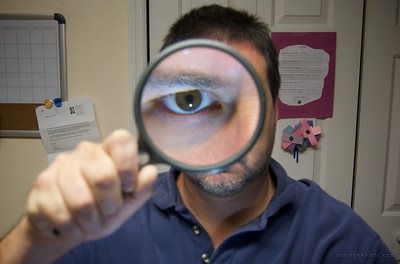Archive for the ‘Authentic’ Category
What To Do When It Matters
 If you see something that matters, say something.
If you see something that matters, say something.
If you say something and nothing happens, you have a choice – bring it up again, do something, or let it go.
Bring it up again when you think your idea was not understood. And if it’s still not understood after the second try, bring it up a third time. After three unsuccessful tries, stop bringing it up.
Now your choice is to do something or let it go.
Do something to help people see your idea differently. If it’s a product or technology, build a prototype and show people. This makes the concept more real and facilitates discussion that leads to new understanding and perspectives. If it’s a new value proposition, create a one-page sales tool that defines the new value from the customers’ perspective and show it to several customers. Make videos of the customers’ reactions and show them to people that matter. The videos let others experience the customers’ reactions first-hand and first-hand customer feedback makes a difference. If is a new solution to a problem, make a prototype of the solution and show it to people that have the problem. People with problems react well to solutions that solve them.
When people see you invest time to make a prototype or show a concept to customers, they take you and your concept more seriously.
If there’s no real traction after several rounds of doing something, let it go. Letting it go releases you from the idea and enables you to move on to something better. Letting it go allows you to move on. Don’t confuse letting it go with doing nothing. Letting it go is an action that is done overtly.
The number of times to bring things up is up to you. The number of prototypes to build is up to you. And the sequence is up to you. Sometimes it’s right to forgo prototypes and customer visits altogether and simply let it go.
But don’t worry. Because it matters to you, you’ll figure out the best way to move it forward. Follow your instincts and don’t look back.
Image credit – Peter Addor
When You Want To Make A Difference
 When you want to make a difference, put your whole self out there.
When you want to make a difference, put your whole self out there.
When you want to make a difference, tell your truth.
When you want to make a difference, invest in people.
When you want to make a difference, play the long game.
When you want to make a difference, do your homework.
When you want to make a difference, buy lunch.
When you want to make a difference, let others in.
When you want to make a difference, be real.
When you want to make a difference, listen.
When you want to make a difference, choose a side.
When you want to make a difference, don’t take things personally.
When you want to make a difference, confide in others.
When you want to make a difference, send a text out of the blue.
And when you want to make a difference for yourself, make a difference for others.
Image credit – Tambako The Jaguar
When You Have Enough…
 When you have enough, you have plenty to give to others.
When you have enough, you have plenty to give to others.
And when you give to others, they remember.
When you have enough, you can be happy with things as they are.
And when you are happy with things as they are, people like to be around you.
When you have enough, there’s no need to take.
And when you don’t take, there’s more for others.
When you have enough, you don’t strive for more.
And when you don’t strive, it’s easier to do what’s right.
When you forget you have enough, tell yourself you have enough.
And when you tell yourself you have enough, you end up remembering you have enough.
When you have enough, there is less stress.
And when there’s less stress, you have more energy to apply in skillful ways.
When you have enough, it’s because you’ve decided you have enough.
Why not decide you have enough?
Image credit — Nenad Stojkovik
Bucking The Best Practice
 Doing what you did last works well, right up until it doesn’t.
Doing what you did last works well, right up until it doesn’t.
When you put 100% effort into doing what you did last time and get 80% of the output of last time, it’s time to do something different next time.
If it worked last time, but the environment or competition has changed, chances are it won’t work this time.
You can never step in the same river twice, and it’s the same with best practices.
Doing what you did last time is predictable until it isn’t.
The cost of trying the same thing too often is the opportunity cost of unlearned learning, which only comes from doing new things in new ways.
Our accounting systems don’t know how to capture the lost value due to unlearned learning, but your competition does.
Doing what you did last time may be efficient, but that doesn’t matter when it becomes ineffective.
Without new learning, you have a tired business model that will give you less year on year.
If you do what you did last time, you slowly learn what no longer works, but that’s all.
The best practice isn’t best when the context is different.
It’s not okay to do what you did last time all the time.
If you always do what you did last time, you don’t grow as a person.
If you do what you did last time, there are no upside surprises but there may be downside surprises.
Doing what you did last time is bad for your brain and your business.
How much of your work is repeating what you did last time? And how do you feel about that?
If you are tired of doing what you did last time, what are you going to do about it?
Might you sneak in some harmless novelty when no one is looking?
Might you conspire to try something new without raising the suspicion of the Standard Work Police?
Might you run a small experiment where the investment is small but the learning could be important?
Might you propose trying something new in a small way, highlighting the potential benefit and the safe-to-fail nature of the approach?
Might you propose small experiments run in parallel to increase the learning rate?
Might you identify an important problem that has never been solved and try to solve it?
Might you come up with a new solution that radically grows company profits?
Might you create a solution that obsoletes your company’s most profitable offering?
Might you bring your whole self to your work and see what happens?
Image credit – Marc Dalmulder
The Power of the Present Moment
 You can’t see if you don’t look.
You can’t see if you don’t look.
You can’t look if you’re distracted.
You can’t be distracted if you’re living in the present moment.
You can’t live in the present moment if you’re sad about the past or afraid of the future.
You can’t be sad about the past unless you want it to be different.
You can’t be afraid of the future unless you want to control it.
You can’t want the past to be different if you accept things as they are.
You can’t want to control the future if you accept you have no control over it.
Yet, we want the past to be different and we want to control the future.
When you find yourself wanting the past to be different or wanting to control the future, focus on your breath for a minute or two. That will bring you back to the present moment.
And if that doesn’t work, go outside and walk in nature for fifteen minutes then quiet yourself and focus on your breath for a minute or two. That should bring you back to the present moment.
Everything gets better when you’re sitting in the present moment.
The Power of Checking In
 When you notice someone having a difficult time, take the time to check in with them. An in-person “Are you okay?” is probably the best way, but a phone call, text, or video chat will also do nicely.
When you notice someone having a difficult time, take the time to check in with them. An in-person “Are you okay?” is probably the best way, but a phone call, text, or video chat will also do nicely.
When you’re having a difficult time, when someone notices and checks in you feel a little better.
When someone reacts in an outsized way, use that as a signal to check in with them. Your check-in can help them realize their reaction was outsized, as they may not know. It’s likely a deeper conversation will emerge naturally. This is not a time to chastise or judge, rather it’s a time to show them you care. An in-person “You got a minute?” followed by a kind “Are you doing okay?” work well in this situation. But a phone call or text message can also be effective. The most important thing, though, is you make the time to check in.
When you check in, you make a difference in people’s lives. And they remember.
Is a simple check-in really that powerful? Yes. Does it really make a difference? Yes. But don’t take my word for it. Run the experiment for yourself. Here’s the experimental protocol.
- Pay attention.
- Look for people who are having a difficult time or people whose behavior is different than usual.
- When you notice the behavior of (2), make a note to yourself and give yourself the action item to check in.
- As soon as you can, check in with them. Do it in person, if possible. If you cannot, call them on the phone or send them a text. Email is too impersonal. Don’t use it.
- To initiate the check-in, use the “You got a minute?” and “Are you doing okay?” language. Keep it simple.
- After using the language of (4.1), listen to them. No need to fix anything. Just listen. They don’t want to be fixed; they want to be heard.
- Enjoy the good feeling that comes from checking in.
- Repeat 1-5, as needed.
After running the experiment, I think you’ll learn that checking in is powerful and helps both parties feel better. And the more you run the experiment (demonstrate the behavior), the more likely it will spread.
And, just maybe, at some point down the road, someone may reach out to you and ask “You got a minute?” and “Are you doing okay?”.
Image credit — Funk Dooby
What do you want?
 If you always want to be right, it’s time to ask new questions.
If you always want to be right, it’s time to ask new questions.
If you want to listen well, don’t talk.
If you want to start something new, stop something old.
If you want to do it again for the third time. give someone else a chance.
If you want it to be perfect, you don’t want to finish.
If you want to do something new, be unsure about what to do next.
If you want to hold tightly to things as they are, all you get are rope burns.
If you want to teach, find a student.
If you want someone’s trust, earn it.
If you want all the credit, you’re fast becoming a team of one.
If you want the Universe to change, don’t.
If you want to earn trust, tell the truth.
If you want good friends, be one.
Image credit — Sowhuan
Speaking your truth is objective evidence you care.
 When you see something, do you care enough to say something?
When you see something, do you care enough to say something?
If you disagree, do you care enough to say it out loud?
When the emperor has no clothes, do you care enough to hand them a cover-up?
Cynicism is grounded in caring. Do you care enough to be cynical?
Agreement without truth is not agreement. Do you care enough to disagree?
Violation of the status quo creates conflict. Do you care enough to violate?
If you care, speak your truth.
“Great Grey Owl (Strix nebulosa)” by Bernard Spragg is marked with CC0 1.0.
What does work look like?
 What does work look like when you prioritize your happiness?
What does work look like when you prioritize your happiness?
When it’s announced that open positions will not be backfilled to meet the practical realities of a recession, you reduce the scope of your projects and push out their completion dates to match the reduction in resources. And the impact on your career? I don’t know, but the people that work for you and everyone else that knows how the work is done will move mountains for you.
Under the banner of standard work, you are given the same task as the one you just completed. Sure, you can do it efficiently and effectively, but if you do that same work one more time, your brain will fall off. So, instead of doing it yourself, you give the work to a lesser-experienced person who is worthy of investment and help them get the work done. They get to learn new skills and the work is done well because you keep them on the straight and narrow. And you get to be a teacher and create a future leader that the company will need in a couple of years. And the downside? The work takes a little longer, but so what.
What does work look like when you prioritize your health?
When an extra-early meeting is scheduled because everyone’s regular day is already fully booked with meetings, you decline the meeting so you can get the recommended amount of sleep recommended by the health professionals. And the negative consequences to your career progression? Well, that’s a choice for your company.
When you get home from work, you disconnect your phone from the company network so you won’t be distracted by work-related interruptions. Because you separated yourself from work, after dinner is cleaned up you can make a healthy lunch for tomorrow. If there’s some downside risk to your career, find another company to work for.
What does work look like when you prioritize your family?
When an extra-late meeting is scheduled because everyone’s regular day is already fully booked with meetings, you decline the meeting so you can cook dinner and eat with your family. The conversation with the kids is mundane and meaningful and ten years from now they’ll be better for it. And the negative consequences? None, because tomorrow morning you can read the minutes of the meeting.
When you’re on your yearly holiday with your family and your boss calls your cell phone to ask you to come back to work early to deal with an emergency, you don’t answer the call and let it go to voicemail. Then, when you get back to the office after vacation, you listen to the voicemail and check in with your boss. And because you didn’t pick up the call, someone else had greatness thrust upon them and developed into someone who can solve emergencies. Now there are two of you. And the downside? Well, I think that depends on your boss.
“Looking For Clues (188 / 365)” by somegeekintn is licensed under CC BY 2.0.
Rediscovering The Power of Getting Together In-Person
 When you spend time with a group in person, you get to know them in ways that can’t be known if you spend time with them using electronic means. When meeting in person, you can tell when someone says something that’s difficult for them. And you can also tell when that difficulty is fake. When using screens, those two situations look the same, but, in person, you know they are different. There’s no way to quantify the value of that type of discernment, but the value borders on pricelessness.
When you spend time with a group in person, you get to know them in ways that can’t be known if you spend time with them using electronic means. When meeting in person, you can tell when someone says something that’s difficult for them. And you can also tell when that difficulty is fake. When using screens, those two situations look the same, but, in person, you know they are different. There’s no way to quantify the value of that type of discernment, but the value borders on pricelessness.
When people know you see them as they really are, they know you care. And they like that because they know your discernment requires significant effort. Sure, at first, they may be uncomfortable because you can see them as they are, but, over time, they learn that your ability to see them as they are is a sign of their importance. And there’s no need to call this out explicitly because all that learning comes as a natural byproduct of meeting in person.
And the game changes when people know you see them (and accept them) for who they are. The breadth of topics that can be discussed becomes almost limitless. Personal stories flow; family experiences bubble to the surface; misunderstandings are discussed openly; vulnerable thoughts and feelings are safely expressed; and trust deepens.
I think we’ve forgotten the power of working together in person, but it only takes three days of in-person project work to help us remember. If you have an important project deliverable, I suggest you organize a three-day, in-person event where a small group gets together to work on the deliverable. Create a formal agenda where it’s 50% work and 50% not work. (I’ve found that the 50% not work is the most valuable and productive.) Make it focused and make it personal. Cook food for the group. Go off-site to a museum. Go for a hike. And work hard. But, most importantly, spend time together.
Things will be different after the three-day event. Sure, you’ll make progress on your project deliverable, but, more importantly, you’ll create the conditions for the group to do amazing work over the next five years.
“Elephants Amboseli” by blieusong is licensed under CC BY-SA 2.0.
The first step is to admit you have a problem.
 Nothing happens until the pain caused by a problem is greater than the pain of keeping things as they are.
Nothing happens until the pain caused by a problem is greater than the pain of keeping things as they are.
Problems aren’t bad for business. What’s bad for business is failing to acknowledge them.
The consternation that comes from the newly-acknowledged problem is the seed from which the solution grows.
There can be no solution until there’s a problem.
When the company doesn’t have a big problem, it has a bigger problem – complacency.
If you want to feel anxious about something, feel anxious that everything is going swimmingly.
Successful companies tolerate problems because they can.
Successful companies that tolerate their problems for too long become unsuccessful companies.
What happens to people in your company that talk about big problems? Are they celebrated, ignored, or ostracized? And what behavior does that reinforce? And how do you feel about that?
When everyone knows there’s a problem yet it goes unacknowledged, trust erodes.
And without trust, you don’t have much.
 Mike Shipulski
Mike Shipulski